Fleurs du Mal Magazine


Or see the index
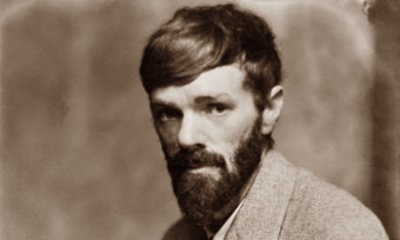
D. H. Lawrence
(1885-1930)
A Young Wife
The pain of loving you
Is almost more than I can bear.
I walk in fear of you.
The darkness starts up where
You stand, and the night comes through
Your eyes when you look at me.
Ah never before did I see
The shadows that live in the sun!
Now every tall glad tree
Turns round its back to the sun
And looks down on the ground, to see
The shadow it used to shun.
At the foot of each glowing thing
A night lies looking up.
Oh, and I want to sing
And dance, but I can’t lift up
My eyes from the shadows: dark
They lie spilt round the cup.
What is it? – Hark
The faint fine seethe in the air!
Like the seething sound in a shell!
It is death still seething where
The wild-flower shakes its bell
And the sky lark twinkles blue –
The pain of loving you
Is almost more than I can bear.
D. H. Lawrence poetry
fleursdumal.nl magazine
More in: Archive K-L, D.H. Lawrence, Lawrence, D.H.
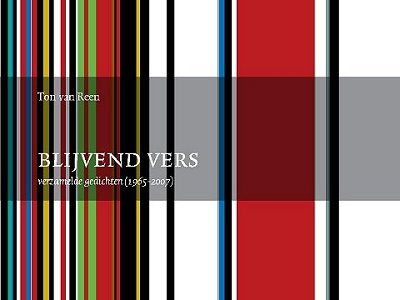
Ton van Reen
spitsuur
Een sirene jankt
en de dag
spat open
fabrieken lopen leeg
schoorstenen wuiven
de arbeiders na
auto’s spelen van
wie komt er in mijn hokje
langzaam lopend
in een rijtje
behangen ze de lucht
met hun ratelend hart
op hoge benen
lopen meisjes voorbij
ongemerkt halen ze
tussen zwoele wanden van ogen
de avond binnen
Uit: Ton van Reen, Blijvend vers, Verzamelde gedichten (1965-2007)
Uitgeverij De Contrabas, 2011, ISBN 9789079432462, 144 pagina’s, paperback
kempis.nl poetry magazine
More in: Archive Q-R, Reen, Ton van, Ton van Reen
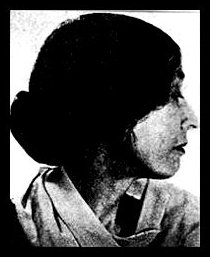
Lola Ridge
(1871-1941)
The Legion of Iron
They pass through the great iron gates–
Men with eyes gravely discerning,
Skilled to appraise the tunnage of cranes
Or split an inch into thousandths–
Men tempered by fire as the ore is
And planned to resistance
Like steel that has cooled in the trough;
Silent of purpose, inflexible, set to fulfilment–
To conquer, withstand, overthrow …
Men mannered to large undertakings,
Knowing force as a brother
And power as something to play with,
Seeing blood as a slip of the iron,
To be wiped from the tools
Lest they rust.
But what if they stood aside,
Who hold the earth so careless in the crook of their arms?
What of the flamboyant cities
And the lights guttering out like candles in a wind …
And the armies halted …
And the train mid-way on the mountain
And idle men chaffing across the trenches …
And the cursing and lamentation
And the clamor for grain shut in the mills of the world?
What if they stayed apart,
Inscrutably smiling,
Leaving the ground encumbered with dead wire
And the sea to row-boats
And the lands marooned–
Till Time should like a paralytic sit,
A mildewed hulk above the nations squatting?
Lola Ridge poetry
kempis.nl poetry magazine
More in: Archive Q-R, Ridge, Lola
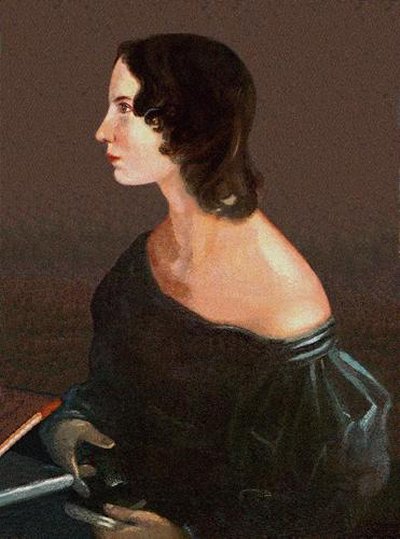
Emily Brontë
(1818-1848)
The Night-Wind
In summer’s mellow midnight,
A cloudless moon shone through
Our open parlour window
And rosetrees wet with dew.
I sat in silent musing,
The soft wind waved my hair:
It told me Heaven was glorious.
And sleeping Earth was fair.
I needed not its breathing
To bring such thoughts to me,
But still it whispered lowly,
“How dark the woods will be!
“The thick leaves in my murmur
Are rustling like a dream,
And all their myriad voices
Instinct with spirit seem.”
I said, “Go, gentle singer,
Thy wooing voice is kind,
But do not think its music
Has power to reach my mind.
“Play with the scented flower,
The young tree’s supple bough,
And leave my human feelings
In their own course to flow.”
The wanderer would not leave me;
Its kiss grew warmer still –
“O come,” it sighed so sweetly,
“I’ll win thee ‘gainst thy will.
“Have we not been from childhood friends?
Have I not loved thee long?
As long as thou hast loved the night
Whose silence wakes my song.
“And when thy heart is laid at rest
Beneath the church-yard stone
I shall have time enough to mourn
And thou to be alone.”
1840
Emily Brontë
De nachtwind
In ‘t milde zomer-nachtuur
Scheen ‘t maanlicht helderblauw
Door de openstaande tuindeur
En rozenboom vol dauw.
Ik zat in rust te mijmeren,
Mij roerde zacht de wind:
Hij vond de Hemel roemrijk,
d’ Aard’, slapend, welgezind.
Zijn adem kon ik missen
Voor zo ‘n gedachtenlijn,
Maar toch sprak hij weer zachtjes,
“Het bos zal donker zijn!
“Het loof ritselt als schimmen
Door mijn geruis geraakt,
En al hun stemmen schijnen
Door geesten wijs gemaakt.”
Ik zei, “Ga, goede zanger,
Al klinkt je vlei-lied zoet,
Meen niet dat jouw nocturne
Mijn denken wankelen doet.
“Bespeel geurende bloemen,
Raak jonge twijgen aan,
Maar laat mijn mens-gevoelens
Hun eigen weg inslaan.”
De zwerver wou niet heengaan;
Zijn kus nam toe in gloed –
“O kom,” zuchtte hij zachtjes,
“Ik win je, wat je ook doet.
“Was jij van jongsaf niet mijn vriend?
Mind’ ik je niet allang?
Zo lang je al dol bent op de nacht
Wekt stilte daar mijn zang.
“En als op ‘t kerkhof in je graf
Je hart is neergevleid
Heb ik veel tijd voor rouwbeklag
En jij voor eenzaamheid.”
Vertaling Cornelis W. Schoneveld
Uit: Bestorm mijn hart, de beste Engelse gedichten uit de 16e-19e eeuw gekozen en vertaald door Cornelis W. Schoneveld, tweetalige editie. Rainbow Essentials no. 55, Uitgeverij Maarten Muntinga, Amsterdam, 2008, 296 pp, € 9,95 ISBN: 9789041740588
fleursdumal.nl magazine
More in: Anne, Emily & Charlotte Brontë, Archive A-B, Brontë, Brontë, Anne, Emily & Charlotte

William Shakespeare
(1564-1616)
THE SONNETS
105
Let not my love be called idolatry,
Nor my beloved as an idol show,
Since all alike my songs and praises be
To one, of one, still such, and ever so.
Kind is my love to-day, to-morrow kind,
Still constant in a wondrous excellence,
Therefore my verse to constancy confined,
One thing expressing, leaves out difference.
Fair, kind, and true, is all my argument,
Fair, kind, and true, varying to other words,
And in this change is my invention spent,
Three themes in one, which wondrous scope affords.
Fair, kind, and true, have often lived alone.
Which three till now, never kept seat in one.
![]()
kempis.nl poetry magazine
More in: -Shakespeare Sonnets
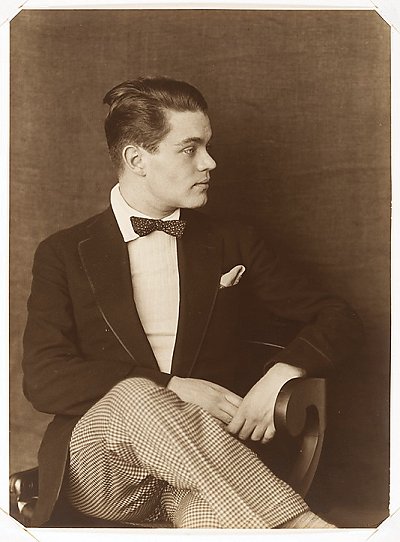
Renée Crevel
(1900-1935)
Autobiographie
Né le 10 août 1900 à Paris de parents parisiens, ce qui lui permet d’avoir l’air slave. Lycée, Sorbonne, Faculté de Droit, Service militaire jusqu’à la fin de 1923, d’où l’impression de ne vivre vraiment que depuis peu de mois. N’est allé ni au Thibet ni au Groenland, ni même en Amérique, mais les voyages qui n’ont pas eu lieu en surface on a tenté de les faire en profondeur. Ainsi, peut se vanter de bien connaître certaines rues et leurs hôtels de jour et de nuit.
A horreur de tous les esthétismes, qu’il s’agisse de celui d’Oxford et de pantalons larges, de celui des remords de cinéma avec leurs maisons de guingois, de celui des nègres et du jazz, des bals musettes et des pianos mécaniques…, etc. Voudrait bien pour des romans futurs retrouver des personnages aussi nus, aussi vivants que les couteaux et fourchettes qui figuraient les hommes et les femmes dans les histoires destinées à demeurer inédites qu’il se racontait enfant.
Avait commencé des recherches pour une thèse de doctorat ès lettres sur Diderot romancier , quand, avec Marcel Arland, Jacques Baron, Georges Limbour, Max Morise, Roger Vitrac, il fonda une revue « Aventure » qui lui valut d’oublier le XVIII siècle pour le XX. C’est alors qu’il connut Louis Aragon, André Breton, Paul Eluard, Philippe Soupault, Tristan Tzara, et un jour, devant un tableau de Giorgio de Chirico, il eut enfin la vision d’un monde nouveau. Il négligea définitivement le vieux grenier logico-réaliste, comprenant qu’il était lâche de se confiner dans une médiocrité raisonneuse, que, chez les vrais poètes, il ne trouvait ni jeux ni mots, ni jeux d’images, mais qu’il les aimait –et parmi eux tout particulièrement Rimbaud et Lautréamont– pour leur pouvoir libérateur.
A participé aux premières expériences hypnotiques d’où André Breton tira des arguments pour son Manifeste du Surréalisme . A donc pu constater de lui-même que le Surréalisme était le moins littéraire et le plus désintéressé des mouvements, et persuadé qu’il n’est pas de vie morale possible pour qui n’est point docile aux voies souterraines ou se refuse à reconnaître la réalité des forces obscures, a décidé une fois pour toutes, et au risque de passer pour un Don Quichotte, un arriviste ou un fou, d’essayer tant par ses actes que par ses écrits, d’écarter les barrières qui limitent l’homme et ne le soutiennent pas.
Son premier roman Détours (N.R.F/ 1924), une œuvre, un portrait (épuisé), était une promenade préliminaire où les critiques, et en particulier Benjamin Vrémieux, Edmond Jaloux, Albert Thibaudet, on reconnu des attitudes, des flâneries et des rages caractéristiques du jeune homme actuel. Mon corps et moi (1925), roman dont le héros porte en soi toutes ses aventures et où les gestes, les personnages ne sont que des prétextes, est un panorama intérieur.
1926
Biographie de René Crevel
Un des quatre enfants d’une famille bourgeoise, avec un père imprimeur et une mère austère, René Crevel apprend le piano et fréquente le lycée Janson-de-Sailly. L’événement traumatisant, quand il a quatorze ans, est le suicide de son père par pendaison. René Crevel s’inscrit à la Sorbonne en droit et en lettres, mais, aux cours, préfère lire et discuter avec des gens liés aux mouvances littéraires d’avant-garde. En 1921, il rencontre André Breton et rejoint les surréalistes, les initiant aux expériences de sommeil hypnotique, avant de rejoindre Tzara et le Dadaïsme pour renouer en 1929 avec les surréalistes. Dans ses trois premiers romans, ‘Détours’ (1924), ‘Mon corps et moi’ (1925) et ‘La Mort difficile’ (1926), René Crevel nous livre, sur le ton de la dérision et de l’humour noir, le panorama intérieur de ses angoisses, le suicide de son père et la haine de sa mère. Il poursuivra cette exploration des profondeurs de son âme par la psychanalyse. Avec ‘Babylone’ (1927) et ‘Etes-vous fous ?’ (1929), il tente de rendre compte des processus inconscients, recomposant cet état de rêve par la prédominance des analogies, d’affabulations et de personnages arbitraires, réconciliant ainsi roman et surréalisme. Il est également l’auteur d’essais théoriques sur le surréalisme, rassemblés dans ‘L’ Esprit contre la raison’ (1927). René Crevel met fin à ses jours à 35 ans.
Renée Crevel poetry & prose
fleursdumal.nl magazine
More in: Archive C-D, Crevel, Renée, SURREALISM, Surrealisme
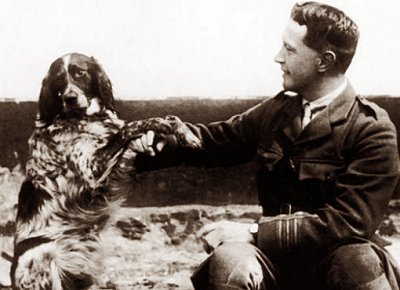
John McCrae
(1872 – 1918)
Anarchy
I saw a city filled with lust and shame,
Where men, like wolves, slunk through the grim half-light;
And sudden, in the midst of it, there came
One who spoke boldly for the cause of Right.
And speaking, fell before that brutish race
Like some poor wren that shrieking eagles tear,
While brute Dishonour, with her bloodless face
Stood by and smote his lips that moved in prayer.
“Speak not of God! In centuries that word
Hath not been uttered! Our own king are we.”
And God stretched forth his finger as He heard
And o’er it cast a thousand leagues of sea.
John McCrae poetry
kempis.nl poetry magazine
More in: Archive C-D, McCrae, John
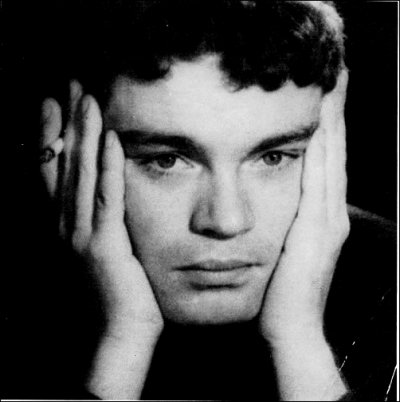
Renée Crevel
(1900-1935)
Métro
Les nègres de mon enfance
tachaient bien le ciel de France
mais leur flûte en acajou
savait un air drôle et doux.
Or les nègres ont perdu
jusqu’à l’orgueil de couleur.
Et de marine vêtus
ils croient encore au bonheur.
Ces enfants des pays chauds
aujourd’hui sont devenus
chefs de gare du métro.
1924
Renée Crevel poetry
kempis.nl poetry magazine
More in: Archive C-D, Crevel, Renée
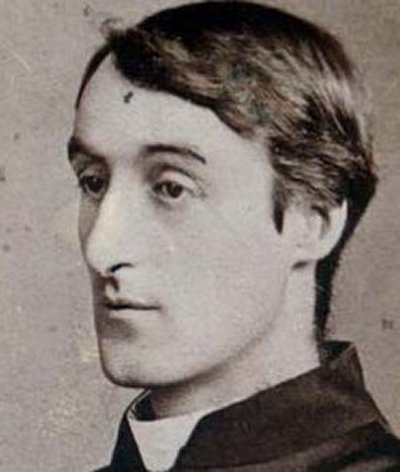
Gerard Manley Hopkins
(1844-1889)
Hurrahing in Harvest
Summer ends now; now, barbarous in beauty, the stocks rise
Around; up above, what wind-walks! what lovely behavior
Of silk-sack clouds! has wilder wilful-wavier
Meal-drift moulded ever and melted across skies?
I walk, I lift up, I lift up heart, eyes
Down all that glory in the heavens to glean our Saviour,
And éyes, heárt, what looks, what lips, yet gave you a
Rapturous love’s greeting of realer, of rounder replies?
And the azurous hung hills are his world-wielding shoulder
Majestic – as a stallion, stalwart, very violet-sweet! –
These things, these things were here and but the beholder
Wanting; which two when they once meet,
The heart rears wings bold and bolder
And hurls for him, O half hurls earth for him off under his feet.
1877
Gerard Manley Hopkins
Opgetogen in oogsttijd
Zomer zinkt nu; nu, schaamteloos schoon, zie schoven staan
Verspreid; daar omhoog, welk ‘n wind-waas! niet lieflijk milder
Kon ‘t zijde-zwerk zijn! is ‘n welbewust-welvender wilder
Meel-drift ooit gevormd en gesmolten in d’ hemelbaan?
Ik loop, ik richt op, ik richt op hart, oog
Langs al dat heil in ‘t firmament om d’ Heiland te lezen,
En óóg, hárt, welke blik, welke lip, gaf jullie ooit, dan deze,
Verrukter liefdesrespons in raker, in ronder vertoog?
En de hemelblauwe heuvels zijn, O hoe verheven,
Z’n aard-torsende torso – als ‘n ruige ruin, zeer lila zoet! –
Deez’ dingen, deez’ dingen waren hier, maar bleven
Zonder beschouwer; eenmaal elkaar ontmoet,
Voedt het hart vleugels gedreven, meer gedreven
En zwiept voor hem, O half zwiept voor hem aard vanonder z’n voet.
Vertaling Cornelis W. Schoneveld
Uit: Bestorm mijn hart, de beste Engelse gedichten uit de 16e-19e eeuw gekozen en vertaald door Cornelis W. Schoneveld, tweetalige editie. Rainbow Essentials no. 55, Uitgeverij Maarten Muntinga, Amsterdam, 2008, 296 pp, € 9,95 ISBN: 9789041740588
kempis.nl poetry magazine
More in: Archive G-H, Hopkins, Gerard Manley, More translations

William Shakespeare
(1564-1616)
THE SONNETS
104
To me fair friend you never can be old,
For as you were when first your eye I eyed,
Such seems your beauty still: three winters cold,
Have from the forests shook three summers’ pride,
Three beauteous springs to yellow autumn turned,
In process of the seasons have I seen,
Three April perfumes in three hot Junes burned,
Since first I saw you fresh which yet are green.
Ah yet doth beauty like a dial hand,
Steal from his figure, and no pace perceived,
So your sweet hue, which methinks still doth stand
Hath motion, and mine eye may be deceived.
For fear of which, hear this thou age unbred,
Ere you were born was beauty’s summer dead.
![]()
kempis.nl poetry magazine
More in: -Shakespeare Sonnets
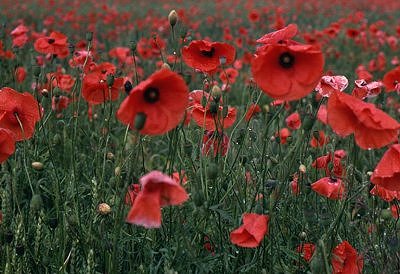
John McCrae
(1872-1918)
In Flanders fields
In Flanders fields the poppies blow
Between the crosses, row on row
That mark our place; and in the sky
The larks, still bravely singing, fly
Scarce heard amid the guns below.
We are the dead. Short days ago
We lived, felt dawn, saw sunset glow
Loved, and were loved, and now we lie
In Flanders fields.
Take up our quarrel with the foe:
To you from failing hands we throw
The torch; be yours to hold it high.
If ye break faith with us who die
We shall not sleep, though poppies grow
In Flanders fields.

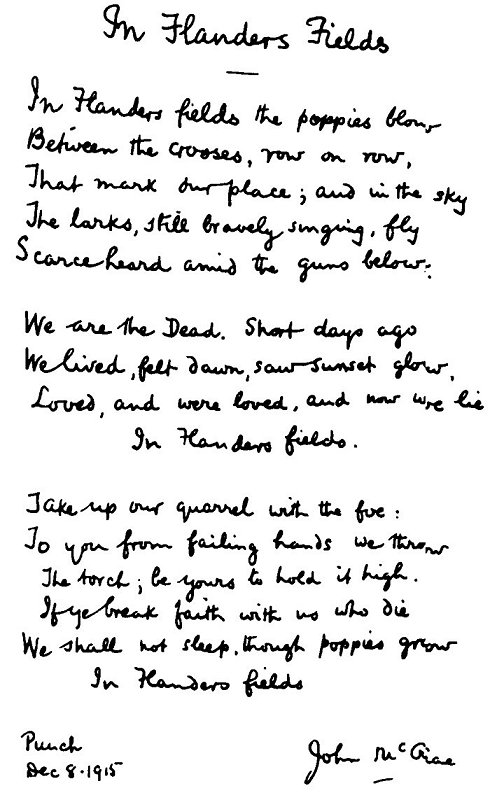
John McCrae poetry
kempis.nl poetry magazine
More in: Archive M-N, McCrae, John
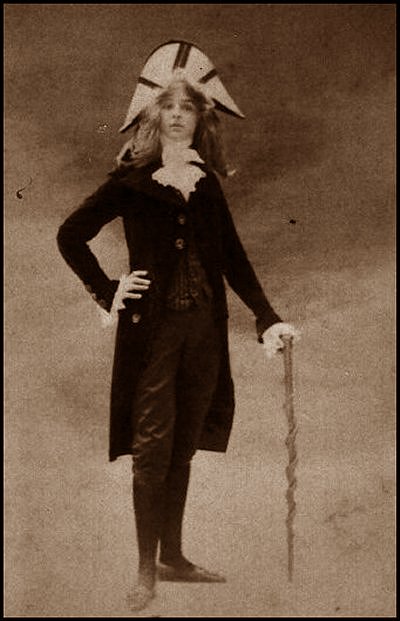
Renée Vivien
(1877-1909)
En débarquant à Mytilène
Du fond de mon passé, je retourne vers toi,
Mytilène, à travers les siècles disparates,
T’apportant ma ferveur, ma jeunesse et ma foi,
Et mon amour, ainsi qu’un présent d’aromates,
Mytilène, à travers les siècles disparates,
Du fond de mon passé, je retourne vers toi.
Je retrouve tes flots, tes oliviers, tes vignes,
Et ton azur où je me fonds et me dissous,
Tes barques, et tes monts avec leurs nobles lignes,
Tes cigales aux cris exaspérés et fous,
Sous ton azur, où je me fonds et me dissous,
Je retrouve tes flots, tes oliviers, tes vignes.
Reçois dans tes vergers un couple féminin,
Île mélodieuse et propice aux caresses,
Parmi l’asiatique odeur du lourd jasmin,
Tu n’as point oublié Psappha ni ses maîtresses,
Ile mélodieuse et propice aux caresses,
Reçois dans tes vergers un couple féminin.
Lesbos aux flancs dorés, rends-nous notre âme antique,
Ressuscite pour nous les lyres et les voix,
Et les rires anciens, et l’ancienne musique
Qui rendit si poignants les baisers d’autrefois,
Toi qui gardes l’écho des lyres et des voix,
Lesbos aux flancs dorés, rends-nous notre âme antique,
Évoque les péplos ondoyant dans le soir,
Les lueurs blondes et rousses des chevelures,
La coupe d’or et les colliers et le miroir,
Et la fleur d’hyacinthe et les faibles murmures,
Évoque la clarté des belles chevelures
Et les légers péplos qui passaient, dans le soir,
Quand, disposant leurs corps sur tes lits d’algues sèches,
Les amantes jetaient des mots las et brisés,
Tu mêlais tes odeurs de roses et de pêches
Aux longs chuchotements qui suivent les baisers,
À notre tour, jetant des mots las et brisés,
Nous disposons nos corps sur tes lits d’algues sèches,
Mythilène, parure et splendeur de la mer,
Comme elle versatile et comme elle éternelle,
Sois l’autel aujourd’hui des ivresses d’hier,
Puisque Psappha couchait avec une immortelle,
Accueille-nous avec bonté, pour l’amour d’elle,
Mytilène, parure et splendeur de la mer !
.jpg)
Renée Vivien poetry
kempis.nl poetry magazine
More in: Archive U-V, Vivien, Renée
Thank you for reading Fleurs du Mal - magazine for art & literature